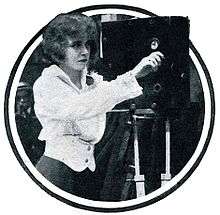Francelia Billington
Francelia Billington (February 1, 1895 – November 24, 1934) was an early American silent-screen actress, and an accomplished camera operator.
Francelia Billington | |
|---|---|
 | |
| Born | Francelia Billington February 1, 1895 Dallas, Texas, U.S. |
| Died | November 24, 1934 (aged 39) Glendale, California, U.S. |
| Occupation | Actress |
| Spouse(s) | Lester Cuneo (m.1920–div.1925) |
| Children | 2 |
Early life
Billington was born in Dallas, Texas, the daughter of James Billington and his wife, musician Adelaide Bueter. She was born and raised on her parents' ranch, where she learned to become an expert at horsemanship, which later served her in a movie career that was to consist of a number of Westerns. She attended school at a convent where, at a very early age, she began playing parts in plays. When she was 10 years old, she moved to New Orleans and continued her interest in outdoor activities, becoming accomplished at swimming, diving and rowing.
Career

She began working in films for the Kalem Company's West Coast studio in 1912, before moving to Reliance-Majestic Studios the following year and continued starring in films under its banner when D.W. Griffith became the studio's director-general. Billington made The Half Breed with Jack Pickford in 1913. The production was filmed at the Majestic Studio on Boyle Heights.[1]
Billington left Majestic in 1915, and following her association with the Palo Alto Film Corporation, where she worked with Nell Shipman, one of the most remarkable figures in film history on the uncompleted film Wanda of the Red Street, joined Universal. There, she played leads for such directors as Rupert Julian and Rex Ingram. In 1917, she went to The American Film Company in Santa Barbara, California to star in features directed by Edward Sloman. Her return to Universal in 1918 brought her a co-starring role in one of silent film's true cinematic milestones: Blind Husbands, Erich von Stroheim's directorial debut. Billington played the wife and Sam De Grasse the husband.[2] Although her performance brought praise from the critics, she earned no other great roles and she continued in a mix of undistinguished melodramas, Westerns, and action films.
Later years
Billington's level of film production slowed down with only five total films in 1918 and 1919. One of her 1920s features was a Western genre film with Tom Mix, titled Desert Love. Later that year, she returned to Rex Ingram's directorship with Hearts Are Trumps. Billington acted the role of Sybil Sayre in the first film made for the Ray Rockett Film Corporation, in 1920.[3] She was cast with Betty Blythe in The Truant Husband (1921). The screenplay was based on a story by Albert Payson Terhune which had appeared in Cosmopolitan Magazine.[4] Billington supported Madge Bellamy in The White Sin (1924).[5]
Marriage
In October 1920 Billington married Lester Cuneo at the Riverside Inn in Riverside, California. They resided at Cuneo's home in Beverly Hills, California[3] and had two children together.[6] The couple appeared in 14 films together, with their last two features in 1925. However, their marriage unraveled, and,\ despondent over the breakdown of the marriage and the downhill slide of his film career, Cuneo committed suicide by shooting himself on November 2, 1925, supposedly two days after his divorce from Billington became final.
Death
Billington's health visibly was declining at the beginning of 1934. She died from tuberculosis, there were no obituaries in the trade papers, and her death went unnoticed by the film industry and the public. She is interred at Calvary Cemetery in East Los Angeles, California.
Partial filmography
- A Mix-Up in Pedigrees (1913)
- The Lover's Gift (1914)
- The Mainspring (1916)
- Naked Hearts (1916)
- The Right to Be Happy (1916)
- The Black Sheep of the Family (1916)
- Bettina Loves a Soldier (1916)
- My Fighting Gentleman (1917)
- The Wrong Man (1917)
- Blind Husbands (1919)
- The Day She Paid (1919)
- The Great Air Robbery (1919)
- Hearts Are Trumps (1920)
- The Terror (1920)
- What a Wife Learned (1923)
- The White Sin (1924)
- Hearts of the West (1925)
- The Mounted Stranger (1930)
References
- Yesterday in the Films, Los Angeles Times, December 1, 1935, pg. H2.
- Von Stroheim Picture Heads Clune Program, Los Angeles Times, June 24, 1924, pg. A11.
- Flashes, Los Angeles Times, October 15, 1920, pg. III4.
- At the Theaters This Week, Washington Post, February 7, 1921, pg. 5.
- Attractions Coming to Local Playhouses, Washington Post, April 17, 1924, pg. 15.
- David K. Frasier: Lester Cuneo
External links
| Wikimedia Commons has media related to Francelia Billington. |
- Francelia Billington on IMDb
- Francelia Billington at AllMovie
- Francelia Billington photo at silentsaregolden
- Frencelia Billington article